|
|
|
Sort Order |
|
|
|
Items / Page
|
|
|
|
|
|
|
| Srl | Item |
| 1 |
ID:
108400
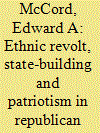

|
|
|
|
|
| Publication |
2011.
|
| Summary/Abstract |
This paper examines how an ethnic Miao uprising in West Hunan in 1937 became the site for the interaction of a broad range of competing local, provincial, and national interests. The target of the uprising was a tuntian system formed from confiscated Miao lands in the early nineteenth century to support a military system defending against Miao disturbances. Surviving anachronistically into the twentieth century, the military land rents of this system formed a base for warlord power on Hunan's western frontier. The uprising arose opportunistically in the context of a struggle over the resources of this system between the warlord of West Hunan and a provincial governor whose provincial state-building project sought to end the region's long political autonomy. The uprising consequently drew the attention of Nationalist Party factions who saw it as an opportunity to use the uprising to undermine the provincial governor in the interest of their own centralizing state-building project. Finally, the outbreak of the Sino-Japanese War allowed uprising leaders to recast the uprising as a patriotic movement, seeking equality for the Miao of West Hunan by the abolition of the tuntian system and offering the mobilization of uprising forces for service at the front once this goal was achieved. In the end, the uprising functioned as a palimpsest upon which the multiple motivations and desires of its participants, in their broad social, political and personal contexts, were written and overwritten.
|
|
|
|
|
|
|
|
|
|
|
|
|
|
|
|
| 2 |
ID:
108396
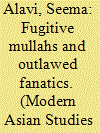

|
|
|
|
|
| Publication |
2011.
|
| Summary/Abstract |
This paper follows the careers of 'outlawed' Indian Muslim subjects who moved outside the geographical and political space of British India and located themselves at the intersection of nineteenth century trans-Asiatic politics: Hijaz, Istanbul and the Arab provinces of the Ottoman Empire, and Burma and Acheh in the East. These areas were sites where 'modern' Empires (British, Dutch, Ottoman and Russian) coalesced to lay out a trans-Asiatic imperial assemblage. The paper shows how Muslim 'outlaws' made careers and carved out their transnational networks by moving across the imperial assemblages of the nineteenth century. British colonial rule, being an important spoke in the imperial wheel, enabled much of this transnationalism to weld together. Webs of connections derived from older forms of Islamic connectivity as well: diplomacy, kinship ties, the writing of commentaries on Islam and its sacred texts in unique ways, oral traditions, madrasa and student contacts. These networks were inclusive and impacted by the tanzimat-inspired scriptural reformist thought in the Arab provinces of the Ottoman Empire. They were not narrowly anti-colonial in tone as they derived from a complex inter-play of imperial rivalries in the region. Rather, they were geared towards the triumph of reformist Islam that would unite the umma (community) and engage with the European world order. The paper shows how this imperially-embedded and individual-driven Muslim transnational network linked with Muslim politics rooted within India.
|
|
|
|
|
|
|
|
|
|
|
|
|
|
|
|
| 3 |
ID:
108397
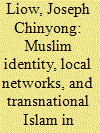

|
|
|
|
|
| Publication |
2011.
|
| Summary/Abstract |
This paper discusses the nature of local permutations of transnational Muslim networks in Thailand's southern Muslim-majority provinces and assesses their impact on creed, custom, and conflict in the region. More specifically, the paper interrogates the agenda and methods of idea and norm-propagation on the part of these agents and networks, and their evolving role, as well as the structures and conduits through which they operate and mobilize. In so doing, it finds a tremendously fluid and dynamic terrain in southern Thailand, where narratives, representations, and expressions of Islamic doctrine, legitimacy, and authority, are increasingly heavily contested within the Muslim community as a whole. In addition, the paper investigates the transnational dimensions of on-going violence in the southern provinces. Here, it argues that there is little by way of substantive evidence of any sustained penetration of the conflict in southern Thailand by external actors. No doubt, many have attempted to draw conclusions to the contrary, but their evidence and arguments, not to mention analytical methodology, are tenuous at best.
|
|
|
|
|
|
|
|
|
|
|
|
|
|
|
|
| 4 |
ID:
108401
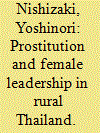

|
|
|
|
|
| Publication |
2011.
|
| Summary/Abstract |
For all the attention paid to the economic, social, and moral dimensions of prostitution in Thailand, no scholar has thus far conducted an empirical study of the relationship between the vice and political change in the countryside, where most sex workers come from. Using the case of Phayao Province in northern Thailand, I attempt to redress this lacuna. I show how rampant prostitution, the most acute social issue in Phayao, has ushered in the rise to power of one virtuous woman from an ethnic minority family-Ladawan Wongsriwong. Located on the economic and social margins of Thailand, many village families in Phayao traditionally relied on prostitution for income, causing a massive influx of young girls into the lucrative sex industry in Bangkok and abroad. In the 1990s, however, AIDS started taking a heavy toll on Phayao's small population. Against this backdrop, Ladawan emerged as a prominent female leader in the male-dominant rural society of Phayao by conducting an extensive issue-oriented campaign against prostitution. This case questions much of the literature on rural politics and female leadership in democratizing Southeast Asia that underestimates the importance of social issues.
|
|
|
|
|
|
|
|
|
|
|
|
|
|
|
|
| 5 |
ID:
108399
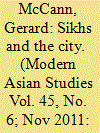

|
|
|
|
|
| Publication |
2011.
|
| Summary/Abstract |
The historiography of South Asian diaspora in colonial Southeast Asia has overwhelmingly focused on numerically dominant South Indian labourers at the expense of the small, but important, North Indian communities, of which the Sikhs were the most visually conspicuous and politically important. This paper will analyse the creation of various Sikh communities in one critical territory in British Asia-Singapore, and chart the development of the island's increasingly unified Sikh community into the post-colonial period. The paper will scrutinize colonial economic roles and socio-cultural formation, whilst links of Singaporean Sikhs to Punjab and their place within the post-colonial Singaporean state will preoccupy the latter portion of the paper. It will argue that more complicated notions of division relative to the social norms of Punjab must be acknowledged in this region of Sikh diaspora and indeed others. The final sections will assess the remarkable success of local Sikhs in utilizing statist policies of 'domesticating difference' towards altered 'community' ends. Such attachment to the state and the discursive parity of Singapore's Sikhs with official values, moreover, stymied the appeal of transnational Sikh militant movements that gained momentum in the West in the 1980s. The result has been the assertion of 'model minority' status for Singapore's Sikhs and notably successful socialization into Singaporean society.
|
|
|
|
|
|
|
|
|
|
|
|
|
|
|
|
| 6 |
ID:
108402


|
|
|
|
|
| Publication |
2011.
|
| Summary/Abstract |
The story of Ya Mo is that of a great Thai heroine honoured with a grand monument (the Suranari memorial) in the centre of Khorat, a city in the north-east of Thailand. The monument is a sacred shrine embedding Ya Mo's guardian spirit which protects the people of the city. She is a grantor of protection, auspiciousness and good luck, and can fulfil wishes, needs and requests. Her spirit can be benevolent as well as ferocious and revengeful. She is a warrior and a guardian, but also a grandmother and a symbol of patriotism, kinship and loving kindness. Ya Mo and her shrine must be perceived in relation to Thai religion and the position of deities, spirits, ghosts and otherworldly beings in Theravada Buddhism. Ya Mo represents a wide range of meanings and functions, but when viewed exclusively as a historical figure, most of these do not surface. In order to understand the Ya Mo phenomenon, the field between religion and magic in Thai Theravada Buddhism must therefore be explored, as well as how people create and uphold distinctions between religion and magic, and how they communicate and negotiate between these two spheres or dimensions. This paper attempts to analyse how non-Buddhist monuments and shrines, in this case a historical memorial to Ya Mo, erected as part of Thai nation-building, represent a vivid part of Thai religious and spiritual life, deeply rooted in a Buddhist worldview.
|
|
|
|
|
|
|
|
|
|
|
|
|
|
|
|
| 7 |
ID:
108398
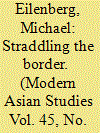

|
|
|
|
|
| Publication |
2011.
|
| Summary/Abstract |
Post-independence ethnic minorities inhabiting the Southeast Asian borderlands were willingly or unwillingly pulled into the macro politics of territoriality and state formation. The rugged and hilly borderlands delimiting the new nation-states became battlefronts of state-making and spaces of confrontation between divergent political ideologies. In the majority of the Southeast Asian borderlands, this implied violent disruption in the lives of local borderlanders that came to affect their relationship to their nation-state. A case in point is the ethnic Iban population living along the international border between the Indonesian province of West Kalimantan and the Malaysian state of Sarawak on the island of Borneo. Based on local narratives, the aim of this paper is to unravel the little known history of how the Iban segment of the border population in West Kalimantan became entangled in the highly militarized international disputes with neighbouring Malaysia in the early 1960s, and in subsequent military co-operative 'anti-communist' 'counter-insurgency' efforts by the two states in the late 1960-1970s. This paper brings together facets of national belonging and citizenship within a borderland context with the aim of understanding the historical incentives behind the often ambivalent, shifting and unruly relationship between marginal citizens like the Iban borderlanders and their nation-state.
|
|
|
|
|
|
|
|
|
|
|
|
|
|
|
|
|
|
|
|
|